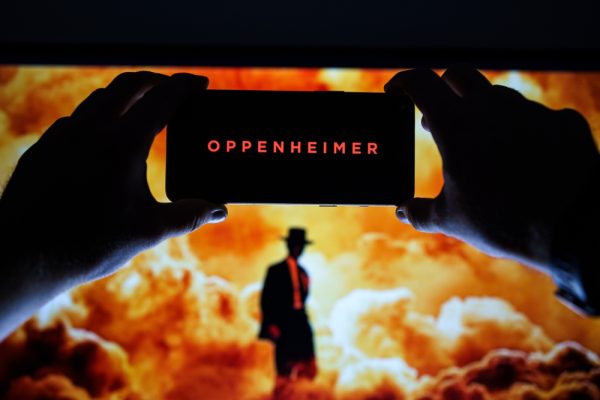July 21, 2023. The much-anticipated date. It was argued whether it was intentional or not. Set to be released on this date were both Christopher Nolan’s “Oppenheimer”, a biopic about the man who made the atomic bomb, and Greta Gerwig’s “Barbie”, a humor-packed journey of discovery.
Sometime around April 2023, the cultural phenomenon Barbenheimer began to rapidly grow in popularity. Up until the movie’s release across theaters, an endless amount of memes, fan art, social media posts, and merchandise spread. As the movie’s release date approached, more content and excitement were pumped out.
“Oppenheimer” and “Barbie” crushed the box office. Along with that, Barbenheimer content skyrocketed. Even the actors of both movies acknowledged this phenomenon by seeing each other’s films. “Barbie” made $155 million on its opening weekend. Its release day sister “Oppenheimer” made $80.4 million on its opening weekend. This began the box office race to see which movie would earn more money. As of Sept. 20, 2023, “Barbie” has made about $1.3 billion whereas “Oppenheimer” has made about $913 million. The Barbenheimer hype since has died down, but the memories of the craze won’t be forgotten by Rocklin High School students. What did they have to say about these movies? Let’s get the Kenergy going by beginning with what students said about Barbie.
One of the main appeals of “Barbie” is its humor. A humorous example from the movie is the contrast between Barbie Land and the real world. Barbie Land follows toy logic, where many of life’s mundane tasks are ignored. For example, when Barbie leaves her house, she floats down from her roof instead of taking the stairs. Also, since the food in Barbie Land isn’t real, the Barbies and Kens don’t eat it. Inedible food in Barbie Land is a running joke throughout the movie and it becomes especially apparent during Barbie and Ken’s trip to the real world. But the real humor of “Barbie” has yet to be spoken about.
The Ken dolls. A couple of Rocklin students just couldn’t get kenough of them. “You should see it for the Kens. They were so funny. The Kens were the saving grace of the movie,” senior Sebastian Meier said. The Kens are light-hearted and dense, which is their humorous appeal. This is represented in the musical number “I’m Just Ken.” Two students at Rocklin High School really enjoyed the song. Meier said, “The ‘I’m Just Ken’ song was fire. That’s all I got to say.” Sophomore Shiva Padmanabhan added, “There’s a reason why the song is good. It’s not just because it’s a banger song but because the message of the song is who you are is good enough.” Humor isn’t the only thing that keeps people interested in “Barbie”: The movie’s messages are also something that deeply resonates with its viewers.
“Barbie” is a positive message about self-worth and understanding. We see multiple characters learn to accept hard emotions and work hard to improve themselves. An example of this is when Ken is able to find his own self-worth and become enough. This self-discovery is best represented in “I’m Just Ken.” He begins the song by saying he would be more important in anywhere but Barbie Land. Throughout the course of the song, he starts to explain how he feels that he is enough by eventually saying, “I’m just Ken (and I’m enough).” Another example of self-improvement in the movie is when Barbie displays maturity in her emotions by allowing herself to cry. Padmanabhan said, ”I have one favorite scene… she’s taking in the real world for the first time and she cries for the first time because the whole point of Barbie is that ‘oh she’s always happy.’ She’s the stereotypical Barbie, right? … it’s so powerful and it feels so real almost.” These aren’t the only things the movie shows. Women empowerment is one of, if not, the most important parts of the movie.
The empowerment of women in “Barbie” is represented in multiple ways. One of these ways is when Barbie sees how women hold less power in the real world. She then returns to Barbie Land to find it controlled by Kens who have renamed it Kendom. This change was a result of the Kens discovering the patriarchy of the real world, which caused them to feel that they should have more power. The Barbies eventually remove the Kens from their patriarchal roles. The removal of the Kens’ status didn’t take away all of their power though. Instead, the Barbies decided to give more power and equality to the Kens. This all ties into the “…Empowerment of women. That was a very clear message they were trying to put across… empowerment and it was greatly portrayed,” Meier added. The movie also plays a part in showing how women are treated in society nowadays.
“Barbie” shows how women can be treated in today’s society. There are several scenes that display what it’s like to be a woman like being on the receiving end of inappropriate remarks and unwanted advancements. The film also goes in depth about what it’s like to be held up to certain standards as a woman that may be seen as hard to meet. This is exemplified when the mother character, Gloria, goes on a rant about the difficulties of being a woman and the amount of standards placed on women in the real world. Sophomore Leah Williams said that scene helped show its message about how she ” … said everything that a woman goes through.” Gloria’s speech connected many people, especially women, as the movie shows what it’s like to be a woman in the modern age.

Oppenheimer also resonated with people but in a different way. It connected people with the memories of emotional trauma from the bombing of Japan. This is a big part of the story of Oppenheimer. What else is in its story? How do students feel about the film?
The atomic bomb. “Oppenheimer” goes through the life of J. Robert Oppenheimer, played by Cillian Murphy, and what led to the invention of the atomic bomb. “… I know Christopher Nolan as a really good director and a lot of people were hyping this up as his best movie ever made,” Padmanabhan said. The creative direction Nolan took with the bomb is something all three interviewed students loved. Leah Williams said, “The movie did a really good illustration of how destructive the bomb could be.” Padmanabhan agreed by crediting this scene as an “audiovisual masterpiece.” Asked what his favorite scene was, Meier said, “They’re all so cinematically perfect.” The after-effects of the bomb being dropped on Japan filled Oppenheimer with guilt and regret. The way Murphy displayed these emotions resonated with two interviewees. Padmanabhan said, “My second favorite scene is … when Oppenheimer is giving a speech talking to a bunch of people about the bomb and he blanks out of it, realizing and trying to come to terms with just exactly what it is that he created.” Although the directing was a major part of what made “Oppenheimer” successful, props should be given to the actors for helping make the film so acclaimed.
The acting in the movie really helped remind the audience that the people portrayed were real people in history. “They did all of the production stuff so well,” Meier said. He also felt strongly about the performances. “They casted it so well, all of the actors they put in, like every part ever, was so perfectly cast,” he said. There were two casting choices he specifically talked about. The star of the show, Cillian Murphy, was complimented for his overall career. “ Cillian Murphy is such a good actor. Props to him.” But Murphy wasn’t the only one who had a stellar performance in the movie. “ Emily Blunt did a great job. She portrayed his wife so well,” Meier said. He held Robert Downey Jr.’s performance in even higher regard. “Robert Downey Jr.’s an amazing actor. He portrayed Strauss’s jealousy of Oppenheimer so well.” He wasn’t the only student who felt this way about this specific casting choice.
Padmanabhan had a more in-depth analysis of Strauss’ character in the movie. “The idea that they went for with the nonlinear storytelling, right? I think it worked really well to their advantage in this case because it makes you think that Lewis Strauss is trying to help Oppenheimer because it starts at the very end of the film where Oppenheimer is talking to Einstein about setting the world on fire,” said Padmanabhan. A few moments later, he said, ” It just really makes you think about how Strauss became like that because it’s not just sudden. There are many many events that add up to this against Oppenheimer [attitude]…” Adding to his analysis so far, he said, “The movie’s direction was really good at making you against him (Strauss) but it was also genius because you could understand why he was angry. He got ridiculed in front of hundreds if not thousands of people.”









